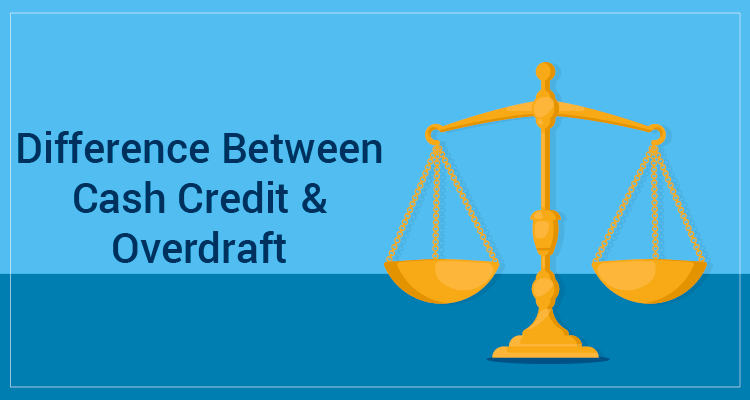Difference Between Cash Credit & Overdraft

Maintaining sufficient funds to meet your operational expenses is key to running a successful business. However, financial institutions can help you with various financing options if you face a cash crunch.
Overdraft facilities and cash credit loans are two of the most commonly used alternatives. Despite the misconception that both products are identical, they differ quite a bit. This blog explains everything about cash credit and overdraft differences.
What Is A Cash Credit Loan?
Cash credit loans are short-term loans provided by financial institutions to help small businesses fund their working capital needs. There is no requirement for companies to have a credit balance to use this funding option.
The list of factors determining your cash credit loan eligibility includes
1. Credit history
2. Type of collateral
3. A positive credit score
4. Business' current assets and liabilities
Key Features Of Cash Credit Loan
Following your introduction to the cash credit loan, its features are as follows
• You can only use a cash credit loan for business purposes.
• You must open a separate bank account to receive cash credit funds.
• Typically, financial institutions require collateral before approving cash credit loans.
• This financing arrangement allows you to repay your loan daily or weekly. There are, however, predefined rules, terms, and conditions for cash credit accounts.
• As part of this financing agreement, there is no restriction on using transaction numbers and chequebooks for the cash credit account.
• To qualify for this loan, you must provide your balance sheet, GST filing, and profit and loss statement quarterly and annually.
Get Gold Loan at the comfort of your home
Apply NowWhat Is An Overdraft Facility?
Financial institutions offer overdraft facilities that allow account holders to borrow up to a particular amount whenever their account balance reaches zero. In an overdraft account, interest applies specifically to the amount withdrawn. You must repay the borrowed amount within a certain period.
Key Features Of Overdraft Facility
The key points to remember about overdrafts are:
• Lenders offer overdraft facilities to customers with a good relationship and a significant investment or account with them. As a result, this facility may not be available to everyone.
• Whenever you withdraw additional funds from your account, financial institutions charge you a fee. The fees vary from one lender to another.
• You can apply for an overdraft even if you have a joint account. In this case, it is the responsibility of both account holders to repay the loan.
• Overdrafts have a different repayment schedule than regular loans. Lenders do not set up EMIs; you must make payments upon demand.
Is Overdraft Protection the Same as Credit?
Even though both overdraft protection and credit cash might sound similar, they are very different in nature and serve distinct purposes. When you consider overdraft protection, it is basically a safety net for your checking account. In the event that you accidentally end up spending more than you have, in that case your bank will cover the overdraft up to a certain limit.
However, it must be noted that these overdrafts come with hefty fees. On the other hand, credit cash works more like a short-term loan. They provide a revolving line of credit that you can use as needed, but interest charges apply on the outstanding balance. While both can offer financial relief, overdraft protection is reactive, designed to prevent bounced checks, while credit cash is proactive, offering a pre-approved borrowing limit.
What Are Three Types of Overdraft Protection?
The Three Types of Overdrafts are:
Overdraft Against Salary
Certain banks offer overdraft facilities to customers who have a salary account with them. Depending on the bank's terms and conditions, the overdraft limit could be up to 3 times the monthly account balance. Here the account holder’s salary among other eligibility criteria will also be taken into consideration.
Overdraft Against Savings Account
Banks also offer overdraft facilities to customers holding a savings account with them. This limit could differ from bank to bank. Even the applicable interest rate and minimum EMI amount will be decided upon by the respective bank where the customer holds his/her savings account.
Overdraft Against Fixed Deposits
A few banks tend to offer overdraft against fixed deposits. In such a scenario, eligible depositors can withdraw only a certain limit, say, up to 90%, of the FD value at an interest rate that is typically 1% to 2% higher than the applicable FD rate. Again this limit will be different for different banks. The overdraft repayment period could vary as per the bank and the customer’s eligibility.
Which Has a Lower Interest Rate, Cash Credit or Overdraft?
The cash credit facility has a lower interest rate in comparison to the overdraft facility.
Cash Credit vs Overdraft Key Differences
The key difference between cash credit & overdraft include:
| Parameters | Cash Credit Loan | Overdraft Facility |
| Purpose |
Businesses can meet their working capital needs with a cash credit loan facility. |
Individuals and businesses can use overdraft facilities to meet short-term financial obligations. |
| Basis |
Stocks and inventories of the business determine the availability of cash credit loans. |
A bank's overdraft facility depends on the applicant's relationship with the institution (the number of investments held, type of account, etc.) |
| Interest Rates |
The interest rate on cash credit is lower than that of overdrafts. |
The interest rate on overdrafts is slightly higher than that on cash credit. |
| Account Opening |
To receive the cash credit loan amount, you must open a new account. |
Existing accounts are eligible for an overdraft facility. |
| Loan Tenure |
A cash credit loan usually has a one-year repayment period. |
A monthly, quarterly, half-yearly, or annual repayment tenure is available for overdraft facilities. |
| Loan Amount |
The sanctioned amount does not decrease over time under this financing arrangement. |
The sanctioned amount on an overdraft facility decreases monthly. |
Similarities between Cash Credit & Overdraft
• Cash Credit and Overdraft interest rates vary based on the amount utilised and not on the sanctioned limit or amount.
• Overdraft and Cash Credit amounts are repayable on demand.
• Current assets secure both of these financial tools.
• There is a set loan limit/amount sanctioned, and you cannot withdraw additional funds in either case.
Small businesses may benefit from cash credit loans and overdraft facilities to meet their working capital needs. You must evaluate both products and their interest rates before choosing a cash credit or an overdraft.
Apply For A Business Loan With IIFL Finance
Overdraft and cash credit are great options for small businesses to meet their short-term financial needs. However, if you want to cover your long-term business needs, a business loan might just be what you need.
With IIFL Finance online business loan, you can finance all your business needs, whether you're starting up or expanding. We offer a competitive business loan interest rate to ensure you don't have to reduce essential business expenses. Let IIFL Finance help you soar to new heights of success with an instant business loan!
FAQs
Q1. What is cash credit?
Ans. A cash credit loan is a short-term loan approved by banks to meet working capital needs.
Q2. Do you have to pay any fees for an overdraft facility?
Ans. A current account overdraft allows you to borrow over and above the amount in the account. This facility usually includes a fee.
Q3. Which account will have an overdraft facility?Ans. Usually, Salary and Savings accounts have an overdraft facility. Some banks even offer this facility to Fixed deposit accounts.
Q4. Is overdraft cheaper than loan?Ans. When it is about short-term borrowing, Overdrafts tend to be cheaper than loans. The reason being, you only pay interest on the amount that you actually overdraw, as opposed to the entire loan amount. Moreover with overdrafts, there’s also the advantage of zero setup fees that further allows for flexible repayments. All said and done, it's crucial to remember that overdraft fees can be steep, and interest rates can be high if you carry a balance for an extended period. So if there is a larger sum involved or there are longer-term needs, a loan might be a more suitable option, even though it typically comes with fixed repayment terms and interest rates. Ultimately, the best choice depends on your specific financial situation and borrowing needs.
Get Gold Loan at the comfort of your home
Apply NowDisclaimer: The information contained in this post is for general information purposes only. IIFL Finance Limited (including its associates and affiliates) ("the Company") assumes no liability or responsibility for any errors or omissions in the contents of this post and under no circumstances shall the Company be liable for any damage, loss, injury or disappointment etc. suffered by any reader. All information in this post is provided "as is", with no guarantee of completeness, accuracy, timeliness or of the results etc. obtained from the use of this information, and without warranty of any kind, express or implied, including, but not limited to warranties of performance, merchantability and fitness for a particular purpose. Given the changing nature of laws, rules and regulations, there may be delays, omissions or inaccuracies in the information contained in this post. The information on this post is provided with the understanding that the Company is not herein engaged in rendering legal, accounting, tax, or other professional advice and services. As such, it should not be used as a substitute for consultation with professional accounting, tax, legal or other competent advisers. This post may contain views and opinions which are those of the authors and do not necessarily reflect the official policy or position of any other agency or organization. This post may also contain links to external websites that are not provided or maintained by or in any way affiliated with the Company and the Company does not guarantee the accuracy, relevance, timeliness, or completeness of any information on these external websites. Any/ all (Gold/ Personal/ Business) loan product specifications and information that maybe stated in this post are subject to change from time to time, readers are advised to reach out to the Company for current specifications of the said (Gold/ Personal/ Business) loan.



